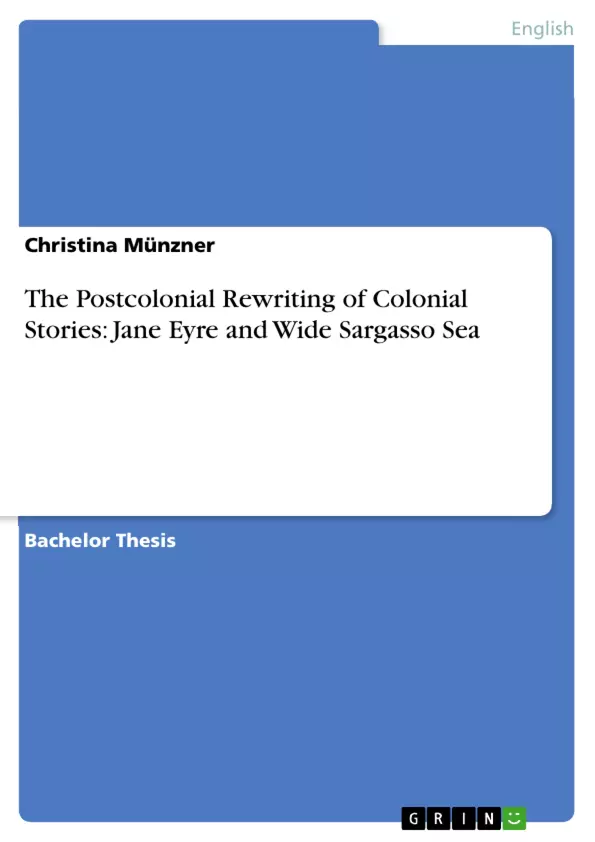Charlotte Brontë's novel Jane Eyre was first published in 1847 in London, at a time when British Colonialism was growing increasingly important for both the provision of cheap labour and new markets abroad. The resulting wealth was crucial for Britain's economic rise and rendered possible the Industrial Revolution as well as an increased amount of political and military power over large parts of the world. Many critics have investigated Jane Eyre in feminist or marxist terms, the former because of Jane's astonishing female individuality for the time, and the latter because of the social mobility shown in the novel (Loomba 2005: 74). But since Charlotte Brontë lived during a time when the British Empire was at its peak, her writing was certainly influenced by a colonial belief system which is also present throughout Jane Eyre.
[...]
Wide Sargasso Sea by Jean Rhys picks up on that notion of the silenced mad woman locked in the attic of an old English manor. Although written in 1966, the novel is widely acknowledged as Jane Eyre's prequel and puts more emphasis on Antoinette's (as named by Rhys) life before she became the wife of a man who is never actually named but is usually identified as Edward Rochester and will be referred to as such in the course of this work. Since the plot of Wide Sargasso Sea starts in Jamaica a few years after the Emancipation Act of 1833, it is historically set in approximately the same time frame as Brontë's text but provides the reader with a much more conscious depiction of colonialist practices and thought.
[...]
The purpose of this thesis is to examine in which aspects Wide Sargasso Sea can be declared a rewriting of Jane Eyre and what features and characteristics allow the former to stand on its own as a novel. A selection of postcolonial theories will provide the theoretical framework in order to substantiate the propositions that are made.
Table of Contents
- Introduction
- Rewriting Colonial Stories
- The Need to Rewrite Jane's Story
- Intertextuality in the Novels
- The Construction of Otherness
- The Dichotomy Between Europe and Its Others
- Knowledge is Power
- Other Modes of 'In-Betweenness'
- Marginality and Madness
- Translation
- The Fear of "Going Native"
- Beyond Rewriting
- Local Knowledge
- Limits of Speaking
- Conclusion
Objectives and Key Themes
This thesis aims to investigate the extent to which Wide Sargasso Sea can be considered a rewriting of Jane Eyre and to explore the characteristics that allow it to stand as an independent novel. The analysis employs a selection of postcolonial theories to support the presented arguments.
- Rewriting colonial texts from a postcolonial perspective
- The intertextual relationship between the characters of Jane, Bertha and Antoinette
- The concept of Otherness and the binary division between European and non-European cultures
- Racial stereotyping in Jane Eyre and Wide Sargasso Sea
- The connection between knowledge and power in the perception of Otherness
Chapter Summaries
The introduction provides a brief overview of the historical context of Jane Eyre's publication and highlights the influence of colonial ideology on the novel. It further introduces the concept of caste as reflected in Jane's choice of Lowood School.
Chapter 1 focuses on the concept of rewriting colonial texts from a postcolonial perspective. It explores the intertextual relationship between Jane Eyre and Wide Sargasso Sea, examining the characters of Jane, Bertha and Antoinette.
Chapter 2 delves into the concept of Otherness, exploring the binary division between European and non-European cultures. It examines racial stereotyping as represented in both novels and the connection between knowledge and power in reinforcing the perception of Otherness.
Chapter 3 examines other modes of not-belonging, including Jane and Antoinette's marginal positions in their respective societies and Antoinette's descent into madness. It explores Rochester's perceived inferior position in the Caribbean and his desire to escape, using the concept of translation in a postcolonial context and the fear of "going native."
Keywords
The primary keywords and focus topics of this thesis include postcolonial theory, intertextuality, colonial discourse, Otherness, race, gender, madness, translation, and the fear of going native. The work examines these concepts through a comparative analysis of Jane Eyre and Wide Sargasso Sea, exploring how colonial power structures and ideologies manifest in both texts.
Frequently Asked Questions: Jane Eyre vs. Wide Sargasso Sea
Why is Wide Sargasso Sea considered a rewriting of Jane Eyre?
It serves as a prequel that gives a voice to the "madwoman in the attic" (Bertha Mason), exploring her origins in the Caribbean and critiquing the colonial perspectives found in Brontë's original work.
What is the postcolonial significance of Antoinette's character?
Antoinette (Rhys's name for Bertha) represents the marginalized "Other," caught between European and Caribbean cultures, illustrating the destructive power of colonialist practices and thought.
How does the theme of madness differ between the two novels?
In Jane Eyre, madness is a plot device for Bertha's character, while in Wide Sargasso Sea, it is shown as a tragic result of cultural isolation, patriarchal oppression, and colonial displacement.
What role does racial stereotyping play in these texts?
The thesis examines how Brontë's novel reflects 19th-century colonial beliefs, while Rhys's novel consciously deconstructs these stereotypes by providing a local, Caribbean perspective.
What is the concept of "Otherness" in this context?
Otherness refers to the binary division between Europe and its colonies, where knowledge is used as power to define non-European cultures as inferior or "mad."
- Quote paper
- B.A. Christina Münzner (Author), 2010, The Postcolonial Rewriting of Colonial Stories: Jane Eyre and Wide Sargasso Sea, Munich, GRIN Verlag, https://www.grin.com/document/181105



